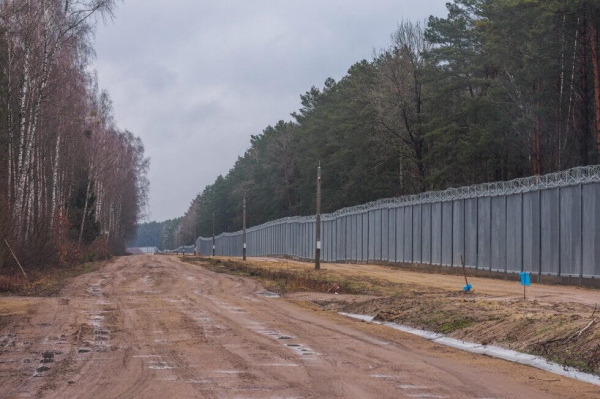
On 18 January 2024, the Provincial Administrative Court in Białystok ruled that the forced return of a Syrian citizen at the state border on 16 May 2023 was legally ineffective.
On 16 May 2023, the appellant crossed the Polish-Belarusian border with a group of Syrian citizens by climbing over the border wall on a ladder. After crossing the border, the group was detained by Polish border guards. According to the foreigner, the border guards used force against the detainees. The migrants were then forced to cross the border in the opposite direction and return to Belarus. The Border Guard did not initiate international protection or compulsory return proceedings against the foreigners, even though, as the appellant reported, they told the officers their reasons for leaving Syria, a country devastated by war.
Lack of evidence cannot be to the detriment of the appellant
In its response to the appeal drafted by the migrant's lawyer, the Border Guard authority pointed to the lack of evidence of the appellant's presence on Belarusian territory and his crossing of the Polish border. The court noted that the Border Guard does not keep records of persons who are returned to Belarus and did not provide any evidence to refute the appellant's claims, which would show, for example, that he was not on Polish territory. According to the court, the appellant's conclusive account as well as generally known information about the way migrants from Belarus enter Poland is sufficient evidence in this case.
The unlawful regulation
The court also found, with reference to previous judgments on pushbacks, that the Border Guard's reliance on the Regulation of the Ministry of the Interior and Administration on the temporary suspension or restriction of border traffic at certain border crossing points of 20 August 2021 (the “Border Regulation”) as the legal basis for the act of returning to the border line is invalid and violates Article 92 (1) of the Constitution of the Republic of Poland, which sets out the procedure for issuing regulations. The court also found that the Regulation is also incompatible with EU law, international agreements and applicable national legislation.
The Provincial Administrative Court also referred to the ruling of the Constitutional Court of 16 February 2010, which states that a legal act implementing a law alone may not change or modify the content of norms contained in a higher-ranking law. The Border Regulation cannot therefore introduce procedures that do not comply with the principles enshrined in a law.
The Provincial Administrative Court emphasised that national provisions or factual circumstances (a crisis at the EU's external border) cannot exclude the application of the principle of non-refoulement, i.e. the prohibition of the expulsion/return of persons to a country where they may be in danger. This prohibition is enshrined in Article 33 (1) of the Geneva Convention as well as in EU primary law (Article 19 (2) of the EU Charter of Fundamental Rights) and in EU secondary law (Article 4 of the Schengen Convention). It is important to note that this prohibition applies wherever a person is under the actual control of state authorities. For the application of this principle, it is irrelevant whether a person has crossed the border unlawfully.
Preventing the appellant from lodging an application for international protection
The court found that the appellant had given the border guards the reasons for his departure from his country of origin, but these had been ignored. The court found that according to the guidelines of the Border Guard Commander, a person can be considered a refugee claimant even if they do not explicitly declare his intention to seek international protection, but implicitly expresses his fear of returning to his country of origin. Even if the appellant did not intend to apply for international protection, the Border Guard authority should prepare a report on the examination of the legality of his stay on the territory of the Republic of Poland and, if it is established that his stay is illegal, initiate proceedings on the obligation of the appellant to return to his country of origin on the basis of the applicable law (Foreigners Act), which would give the applicant the status of a party and the right to actively participate in the proceedings. According to the court's reasoning, the appellant could only be expelled from the territory of the Republic of Poland once the proceedings are concluded with a final decision obliging him to return and the finding that he has not voluntarily left the territory of Poland within the specified period, provided that the appellant's legal remedies in these proceedings have been exhausted.
Importantly, the court also pointed out that the border guards did not check the individual situation of the appellant, which means that the forcible return of the complainant to the border line was carried out arbitrarily. The court also pointed out that the need to verify the situation of each individual person is all the greater considering the particular modus operandi of the Belarusian services, which prevent migrants from entering Belarus and detain them in the border area regardless of weather conditions, time of day, state of health or age.
In conclusion, the court found that the border guards had prevented the submission of an application for international protection. The court also pointed out that border control procedures must take into account not only the interests of the state, but also its international obligations to protect foreigners.
The judgment, which can still be appealed against, is in line with the uniform case law of the Polish courts, which confirm the illegality of the Border Regulation and the pushbacks, i.e. the forcible rejection of migrants at the border line. In view of such case law, we expect the Ministry of the Interior and Administration to repeal the Border Regulation immediately. Maciej Duszczyk, the Deputy Minister of Interior and Administration responsible for migration policy, has recently announced that the regulation will be amended. Due to its undeniable illegality, the HFHR strongly recommends abolishing the pushback procedures and revoking the regulation rather than attempting to amend it.


